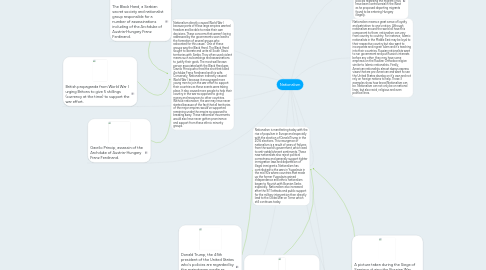Nationalism
by A Random Student

1. Nationalism directly caused World War I because parts of these large empires wanted freedom and be able to make their own decisions. These concerns that weren't being addressed by the governments soon lead to the formation of several groups who advocated for this cause. One of these groups was the Black Hand. The Black Hand sought to liberate and unite all South Slavic territories with Serbia. They often used violent means such as bombings and assassinations to justify their goals. The most well known person associated with the Black Hand was Gavrilo Princip who fired the shot that killed Archduke Franz Ferdinand and his wife. Conversely, Nationalism indirectly caused World War I because it encouraged more young men to join the war effort to support their countries as these events were taking place. It also caused more people to help their country in the war as opposed to giving money and resources to other countries. Without nationalism, the war may have never started because of the fact that all territories of the major empires would've supported remaining under the empire as opposed to breaking away. These nationalist movements would also have never gotten prominence and support from these ethnic minority groups.
2. The Black Hand, a Serbian secret society and nationalist group responsible for a number of assassinations including of the Archduke of Austria-Hungary Franz Ferdinand.
3. Gavrilo Princip, assassin of the Archduke of Austria-Hungary Franz Ferdinand.
4. British propaganda from World War I urging Britons to give 5 shillings (currency at the time) to support the war effort.
5. Nationalism is manifesting today with the rise of populism in Europe and especially with the election of Donald Trump in the 2016 elections. This resurgence of nationalism is a result of years of failures from the world's government, which lead to anti-establishment sentiments. These new nationalists also reject political correctness and generally support tighter immigration laws and deportation of illegal immigrants. Nationalism has contributed to the wars in Yugoslavia in the mid 90s where countries that made up the former Yugoslavia gained independence and ethnic nationalism began to flourish with Bosnian Serbs especially. Nationalism also increased after the 9/11 attacks and public support for the military intervention then directly lead to the Global War on Terror which still continues today.
6. Donald Trump, the 45th president of the United States who's policies are regarded by the mainstream media as being populist and nationalistic.
7. The National Front, a populist party in France which is running in the 2017 presidential elections. It is lead by Marine Le Pen.
8. Nationalism means a great sense of loyalty and patriotism to one's nation. Although nationalism around the world all have this component to them, nationalism can vary from country to country. For instance, Islamic nationalists in the Middle East may be loyal to their respective country but also want to incorporate and ingrain Islam and it's teaching into their countries. Russian nationalists want to run government and put Russia's interests before any other, they may have some emphasis on the Russian Orthodox religion similar to Islamic nationalists. Finally, American nationalists almost always express views that are pro-American and want to see the United States develop on it's own and not rely on foreign nations to help. These 3 examples show how broad Nationalism can be. Nationalism can not only be on national lines, but also racial, religious and even political lines.
9. Viktor Orbán, the Prime Minister of Hungary is regarded as a Hungarian nationalist and justifies this with his Eurosceptic views. Some of his policies regarding the migrant crisis have been controversial in the West as he proposed deporting migrants found to be entering Hungary illegally.
10. A picture taken during the Siege of Sarajevo during the Bosnian War. The Bosnian War was a part of the Yugoslav Wars which was a primarily ethnic based conflict. It saw nationalism rise in the former Yugoslavia.


